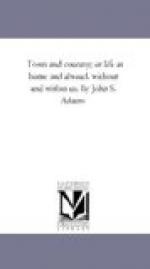“Susan was at home, seated in the middle of a great room, as if on exhibition; and perhaps she was,—I thought so. I had seen Susan before, and always disliked her. There was nothing in her personal appearance, or her mind, that pleased me. I never met her without marking her future life as that of an old maid. But she was to be my wife; father said so, mother shouted amen; and I was to love her, and so I said I did, ‘of course.’
“It seemed to me that she knew all about what I came for; for she put out her little slim hand, that never made a loaf of bread nor held a needle, but had only fingered the leaves of Greek and Latin Lexicons, and volumes of Zoology and Ornithology, and thrummed piano-keys,—all very well in their place (don’t think I depreciate them), but very bad when their place is so large that there’s no room for anything else,—very bad, sir.
“As she took my hand she attempted to kiss me; but, being rather shy, I dodged when I saw her lips a-coming, and they went plump on to father’s nose, and exploded on his piece of court-plaster.
“It was all fixed that night, and I was to be married one week from the ensuing Sunday.
“We went home. I received a smile from those who were so considerate as to hunt me up a wife.
“If you’d seen the Greentown Gazette a fortnight after, and had looked at the list of marriages, you might have read, ’Married: In this town, by Rev. Ebenezer Pilgrade, Mr. Jacob Jenkins, Jr. (recently from college), to Susan Jane Maria Parsons, estimable daughter of Nehemiah Q. Parsons; all of this place.’
“We lived at home. My wife soon found out what I was, found out that I was an Automaton, and she pulled the wires and put me in motion, in any way she wished. I opened an office, put out a sign, and for a time practised law and physic, and when the minister was sick took his place and preached. I preached just what they wanted me to. I felt more like an Automaton than ever, stuck up in a high box, talking just what had been talked a thousand times from the same place. It would n’t do, I was told, to have any ideas of my own; and, if had them, I must n’t speak them. So my parish and me got along pretty well.
“Of course I had joined the church. I was told that I must, and so I did; but I won’t tell you what my thoughts were in regard to what I was told to believe, for that’s delicate ground. I don’t know what your religion is, sir, and I might offend you, and I would n’t do so for the world. You see I am an Automaton yet. I’ll do just as you want me to. I hate to be so; but, somehow or other, I can’t be otherwise. It’s my nature.
“You think I’m prosy. I won’t say much more, for I see you take out your watch as though you wished I’d stop, that you might go; so I’ll close with ‘finally,’ as I do in preaching.




